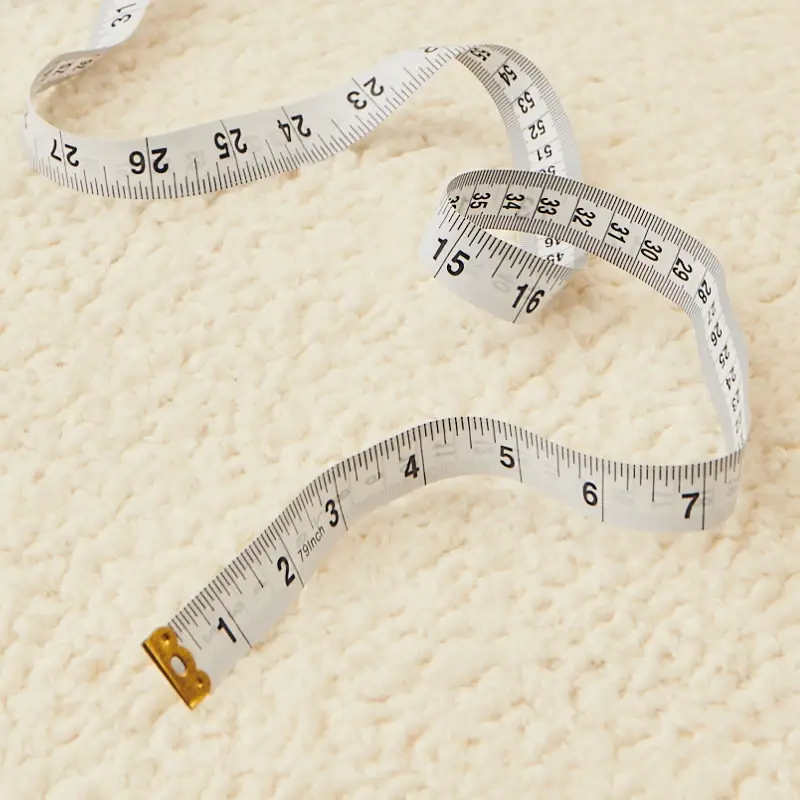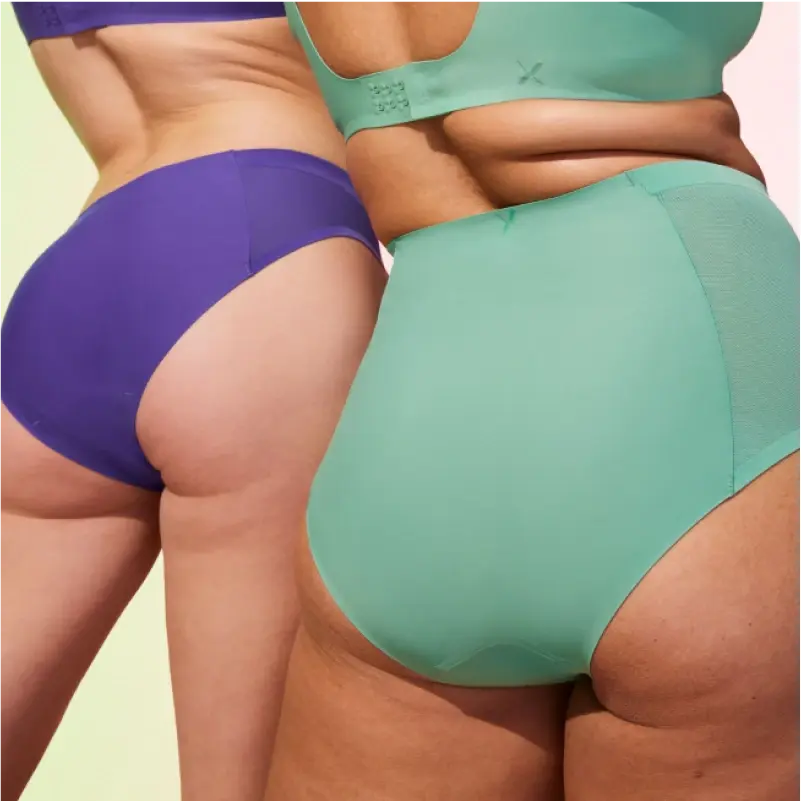Our Approach to Product Testing and Safety
December 2024 / Team Knix
At Knix we are proud that our customers trust us with their bodies. They trust us to photograph them as part of our campaigns, they trust us to share their stories, and above all—they trust us to make intimates that are comfortable, safe, and effective.
As part of that trust we are committed to doing everything we can to ensure that we do not intentionally use toxic or harmful chemicals in our products and to be open and honest about what, exactly, that promise means. We began routine testing for certain per- and polyfluoroalkyl substances (PFAS) in our leakproof fabrics and leakproof products back in January 2020 when questions began to arise in the global community regarding a potential link between the period underwear category and PFAS given the water repellent nature of certain products in that category. Shortly thereafter we began testing for organic fluorine (the “F” in PFAS).
We have been sharing examples of our test results with the Knix community since January 2020 and will continue to do so. To skip to see sample results please scroll down to the bottom of the blog post. These results are from leading testing labs, and what you will find when reviewing them is that neither PFAS nor organic fluorine was detected at the testing limits. We will continue to routinely update our blog so you can see the results from our most recent testing, which is part of our quality procedure. The most recent test results shared are from December 2024 and the testing limits used were 0.01 - 1 parts per million (ppm) which can also be stated as 10-1000 parts per billion (ppb) for the PFAS testing and 20 ppm for organic fluorine testing.
Doing the real work to ensure that our products are safe, and that our consumers understand the science, is no small feat. We will continue to monitor the complex and ever-changing world of PFAS – a vast number of chemicals that the government, researchers, and companies are still struggling to fully define and understand.
These complexities are part of the reason that we have publicly advocated for increased PFAS regulation and education. The bottom line is that the best we can do at Knix is to source quality materials and test them along with finished leakproof garments to help ensure PFAS are not intentionally used in their manufacture. Knix, or any company for that matter, cannot promise that a product will make it to customers PFAS free because of the omnipresence of PFAS in the environment (they can be found in water, air, soil and even breast milk) and the supply chain, which creates the potential for trace levels of PFAS or PFAS-like chemicals to inadvertently find their way into products.
Let’s begin by sharing a high level overview of our sourcing and testing protocols for our leakproof products:
- It starts with efforts to source quality fabrics, many of which are evaluated by an independent third party for certain regulated and non-regulated substances. We also conduct our own testing of the fabrics both for specific PFAS and for organic fluorine. Only fabrics that meet our strict standards are used.
- We contractually prohibit our manufacturing suppliers from intentionally using PFAS, which are on our restricted substance list.
- We also require our suppliers to guarantee that the products and materials they supply to us do not contain added PFAS, and require them to conduct their own quality control testing for PFAS and fluorine.
- We test our products regularly for the most commonly analyzed PFAS.
- We conduct regular organic fluorine testing. We routinely test samples of finished products.
- We share sample results from our routine spot testing for finished products here on this blog. To see sample results please scroll down.
What are PFAS?
Although the exact definition varies throughout the globe, PFAS (per- and polyfluoroalkyl substances) is a term commonly used to refer to a large number of synthetic chemicals that have carbon and fluorine bonds. PFAS are used in wide array of commercial and industrial products, and they have historically been used in the textile and apparel industry as a stain or water repellent. The two most commonly discussed PFAS are PFOA (perfluorooctanoic acid) and PFOS (perfluorooctane sulfonate), but according to the United States Environmental Protection Agency (EPA), there are over twelve thousand different PFAS out there. Research is still ongoing to identify, test and understand the potential human and environmental health impacts of these substances.
While it is not currently feasible to test for all 12,000 PFAS directly, we do know that all PFAS contain organic fluorine (this is the “F” in PFAS). Organic fluorine is typically synthetic and is one known PFAS marker. It is not to be confused with inorganic fluoride, which is found naturally in many minerals and other materials (including toothpaste and drinking water) and does not indicate the presence of PFAS. What does this mean? Testing for organic fluorine is the most efficient way to screen products to determine whether they may contain any of the thousands of different PFAS.
We Do Not Add PFAS
At Knix we do not intentionally use PFAS in the manufacturing of our leakproof products. However, PFAS are now so widely dispersed in the environment that even the water we drink has low levels of contamination that, unfortunately, cannot be avoided. These fluorinated compounds are also unavoidably present in supply chain processes, such as in the cleaning solutions and water used on manufacturing equipment.
Knix can and does control the safety and the quality of the materials we use. For example, Knix takes steps to ensure that all of its third-party textile suppliers do not intentionally use PFAS in the fabrics they supply to us. First, we prohibit all of our materials suppliers for our leakproof products from using PFAS in the manufacture of Knix products, and require them to guarantee that the products and materials they supply to us do not contain added PFAS. Second, we require our suppliers to conduct their own quality control testing for PFAS and fluorine. Third, we test the fabrics we order for the presence of organic fluorine – the defining element of PFAS. Any fabrics that do not meet our standards will not be used by Knix and will not make their way into your hands or onto your bodies.
Knix can also control the frequency, accuracy, and transparency of its PFAS testing. In addition to organic fluorine testing, Knix also regularly tests its products for the most common PFAS. Read more about our testing – and how it has evolved over the years – below.
Knix’s PFAS & Organic Fluorine Testing
PFAS Testing
Before January 2020 PFAS was not generally a topic connected to our product category and as a result we had never tested our products for PFAS or made any public claims related to PFAS. Our leakproof technology was manufactured in Italy and subject to relevant legislation regulating PFAS substance restrictions applicable in the European Union, which have been quite progressive when compared to those in the US and Canada.
However, in early 2020, as Knix and others in our industry became more cognizant of PFAS, we and pursued extra third-party testing for peace of mind. This testing, an industry standard, is capable of identifying 20-30 main PFAS (like PFOA), which our Leakproof Underwear were cleared for. You can read a recent “non-detect” (meaning the particular PFAS were not detected) PFAS test report at the bottom of this page.
Fast forward to today, Knix partners with an industry-leading lab and experts that guide our PFAS testing, including testing for a wider array of PFAS.
Organic Fluorine Testing
In January 2020, we also began testing the fabrics used in our Leakproof Underwear products for fluorine (in addition to the direct PFAS testing described above), after learning that all PFAS contain organic fluorine. Since then we have made testing for fluorine part of our testing process and will continue to do so going forward. You can check out what a non-detect fluorine report looks like at the bottom of this post in a sample 2022 report for leakproof, super leakproof and cotton super leakproof.
We mentioned earlier the important difference between organic fluorine and inorganic fluoride. Several of our products are made with materials that can be expected to naturally contain inorganic fluoride (which is not found in PFAS). We learned that using a material we know is safe – seaweed! – could potentially skew total fluorine test results (i.e., testing for all fluorine, regardless of whether it is organic or inorganic) without actually indicating that our products contain PFAS. When reading about fluorine testing as connected to PFAS it’s important to ensure the testing is for organic fluorine, rather than total fluorine or inorganic fluoride.
Fast forward to today, Knix partners with an industry-leading lab and experts that guide our testing for organic fluorine.
What’s Next
Having launched in 2013, we pride ourselves on being pioneers within the period underwear and leakproof underwear industry and as such we are leading by example— by calling for more transparency and stricter regulations in this growing category. Our work is ongoing, but we want to include you in our journey to address this PFAS issue in meaningful and informative ways.
Thank you for trusting us to make your intimates. If you have any other questions about product safety, please don’t hesitate to reach out to our team at info@knix.com.
Test Results


































